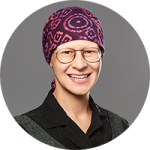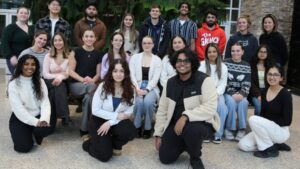Summary:
Associate Professor
Associate Member, Biology
Dr. Kim Dej completed her undergraduate at the University of Toronto (St. George) in the Molecular Genetics program with a Major in Zoology and a Minor in Botany. During this time she developed an interest in genetics, chromosome structure, and transposable elements. She completed her PhD at Johns Hopkins University with Allan Spradling (Carnegie Institute of Washington) and went on to be a postdoctoral fellow at MIT with Terry Orr-Weaver (Whitehead Institute for Biomedical Research). She joined the McMaster community in 2004 where her teaching has focused on genetics, cell biology, research methods, undergraduate laboratory experiences, in addition to community engagement and science communication. Dr. Dej has taught in the Life Sciences program since 2009 and she has been a part of the evolution of the program. She has won several teaching awards including the McMaster President’s Award for Outstanding Contributions to Teaching and Learning, a McMaster Student Union Award (Science), an OCUFA Teaching Award, and a YWCA Woman of Distinction Award for Education and Mentorship.
Research Interests:
nematode biodiversity; authentic lab research and the undergraduate experience; peer-mentorship and undergraduate student engagement; digital storytelling and student learning
Dr. Dej’s lab research with undergraduate students has focused on the cell cycle in Drosophila melanogaster and biodiversity in nematode species. In 2015 Dr. Dej became a MacPherson Teaching Fellow, which has allowed her to identify and expand independent undergraduate research opportunities on campus. This has been possible by focusing on training (the interactive Nematode Diversity Project eBook lab manual), space (The Applied Learning Lab for Undergraduate Research Excellence, or ALLURE), and funding (small grants that encourage peer-learning and collaboration in undergraduate thesis research). This is part of her broader interest in providing authentic research opportunities embedded in courses for undergraduates even in large courses and assessing the role these experiences play in engaging students. These opportunities are illustrated by development of the Amylase Gene Project (with Alastair Tracey, BIOL1A03), Personal Genome Testing (with Mihaela Georgescu, MOLBIOL2C03), and the development of the Living Systems Lab in the School of Interdisicplinary Science (various student, staff, and faculty collaborators, LIFESCI2L03 & LIFESCI3L03). In 2016 to 2018, Dr. Dej was a MIIETL Leadership in Teaching and Learning (LTL) Fellow. She has used this as an opportunity to partner with students in curriculum development, including assessing the impact on student engagement and learning of cohort-building and scaffolded peer-mentorship within interdisciplinary streams in the Life Sciences program. In partnership with the McMaster Children and Youth University (MCYU) and MacPherson student partners, Dr. Dej is leading the development of ebooks for elementary and middle-school students. Within this project, research is focused upon measuring the impact of the interactive digital storytelling on the learning in addition to the impact of community-engaged learning on university students.
Courses:
CMTYENGA2A03: Foundations in Community Engagement
LIFESCI4N03 (Visualizing Science)
LIFESCI2G03: Genes, Genomes, and Society
Discovery Program (through Arts & Science program)



















